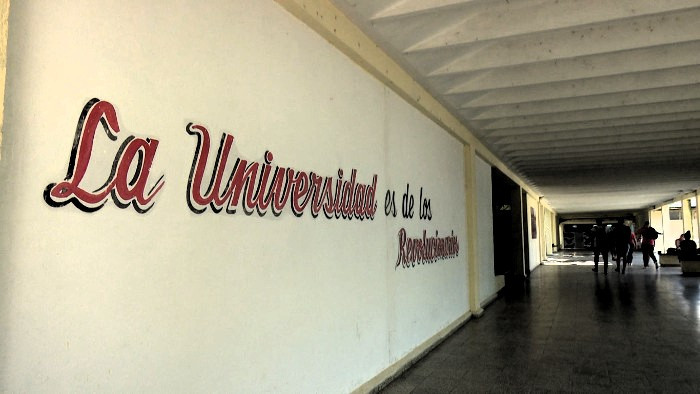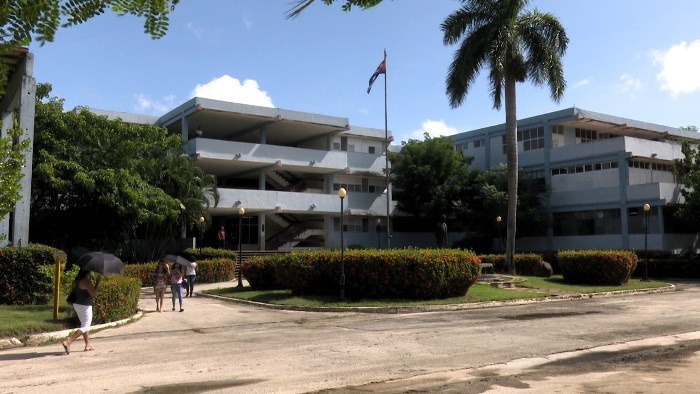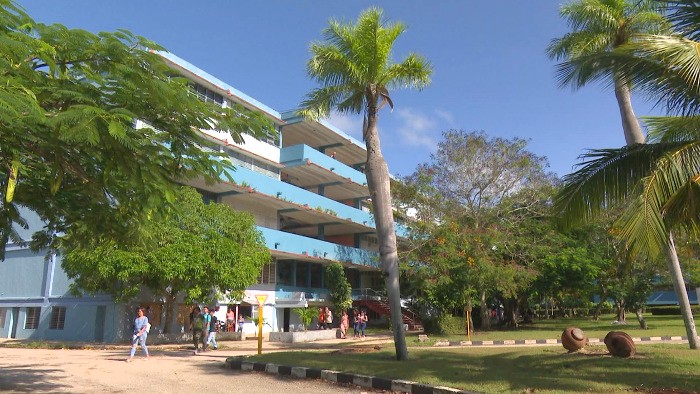CAMAGÜEY.- The University of Camagüey (UC) Ignacio Agramonte Loynaz has just turned 52 years. Today it is the greates study center in this province, with over fifty programs, only of undergraduate education, distributed in the ten faculties of its three academic seats.
It was the first college institution founded in Cuba after the triumph of the Revolution. Today, it has over 132 signed agreements with institutions of 33 countries. Likewise, over 78 000 students from its classrooms have graduated, of them 1 276 are foreign professionals in over 75 countries.
However, these five decades have not always been rosy for the teachers and the students. Besides the effort and daily devotion that involves the research work, the University has got to carry a heavy burden.
For worst, not for good, his track has been marked by another historical event that also changed the life of every Cuban: five years before the UC was founded, John F. Kennedy, president of the United States back then, signed the executive order that formally instated the economical, commercial and financial blockade to our country.

To put it in a different way, no student or professor of the UC knows what is like to carry an academic life without the harassment of a foreign government. That is the claim of Doraine Linares, fourth year Law student, who has seen for herself the consequences of a policy that, even failed, does not seem to end.
“Because of the blockade, it is difficult for us to have academic exchange with foreign professors, to move students from and to other universities out of Cuba, and to participate in international events”, examples set by Doraine, who is well known around, since she is the president of the University Students Federation (FEU, Spanish acronym) in the institution.
The professor of the Agronomy department in the Faculty of Agricultural Sciences, Carlos Manuel Batista adds on this subject: “In the university we can see the effects of the blockade in the inability of our professionals to access specialized bibliography, or chemical or biological reagents for our laboratories, or professionals softwares.”
“We have also seen the actions of the blockade when there is no attendance of foreign professionals in events organized by the University. They have been bound to refuse because of fear of retaliation from the United States for entering in our territory”, he adds.
“It is unfair and immoral”, passionately claims other of the professors of this center, Jorge Beranes. And adds to his summarized accusation: “The blockade is the main obstacle in the way of our development, not only in the university, but in the entire country.”
And of course he is right. Even when its consequences can be quantified in economic losses; other damages are less “measurable” with numbers and calculators: the one suffered by Cuban men and women in their daily life, prevented from carrying a ‘normal’ life”.
The same happens to the students and professors of the UC. The PhD. Amílcar Arenal Cruz, dean of the Faculty of Agricultural Sciences, knows very well what are there “adverse” effects of the blockade by Trump and other ten American presidents: “Since 2013 we have international projects. Our faculty alone has five with Belgian institutions. But that collaboration is obstructed by the dispositions of the blockade, that limit us when we have to pay through foreign banks, for example, or buy the reagents for our experiments.”
However, the damages go beyond: “The 90% of the reagents we use are made in the US, so it is very difficult to obtain them. While other products are worth two or three times more in Europe, so they get very expensive”, said professor Amílcar to Adelante digital, who imagines how developed would the University and Cuba be if not for the blockade.
But, for now, it is still a sad reality that strikes the different education works in the UC. In the Faculty of Construction, for instance, the chief professor of the Architecture career, María Lourdes Pérez Llanes, tells: “To train an architect is expensive and even more in a public and free education like ours. It is a career that requires a lot of supplies for design and graphic expression, and every year it is harder to obtain them”.
But, who said the youngsters just do nothing? “In this context, our students have developed a creativity exceeding the expectations of the career to face these serous problems with the materials”, claims professor Pérez Llanes.
The rector of the UC, PhD. C. Santiago Lajes Choy, affirmed that, in spite of the economical adjusts made because of the current situation caused by Donald Trump’s administration, non of the 53 careers studied there will be canceled.

“Trump’s administration practically makes a zero every day, and we have to stay active. The university has made adjustments to the programs, without decreasing the quality, like in some engineer careers. Measures like teaching in closer locations to save in transportation, or increasing the participation of students in production, which not only benefits those centers, but also the students”, explains the rector.
The over 2 500 students that come from other territories to live here, he says, will not be affected either. “We have kept the dormitories, in spite of the measures of energetic saving. We are still adjusting because the main objective is to keep the center open, under no circumstance it will close. Truer than Trump’s blockade is that the university continues and will stay that way”, energically states, as if he was talking to Trump himself.
Meanwhile, Norbis Cabrera Pérez, fifth year architecture student, form the “group” that professor María Lourdes mentioned, says about it: “Higher education in Camagüey has great challenges, because we have to overcome daily the limits set by the blockade and Trump’s administration”.
With the optimism of young people, Norbis summarizes what we as Cubans can do – beyond what “they are doing to us” – for stopping them from taking us down: “In the UC, we have to impose ourselves, looking for new ways, developing both human and technological resources in our research centers. There are barriers we have to overcome, to accomplish national and international competition along other universities”. That is the greatest challenge.
At 23 years old, the vice president of the FEU hopes that sooner rather than later, comes the end for the economical, commercial and financial blockade that for almost 58 years has troubled the development of the Island. His professors and student peers also long for it. And, of course, every Cuban.
- Translated by Elianna Díaz Mendieta

